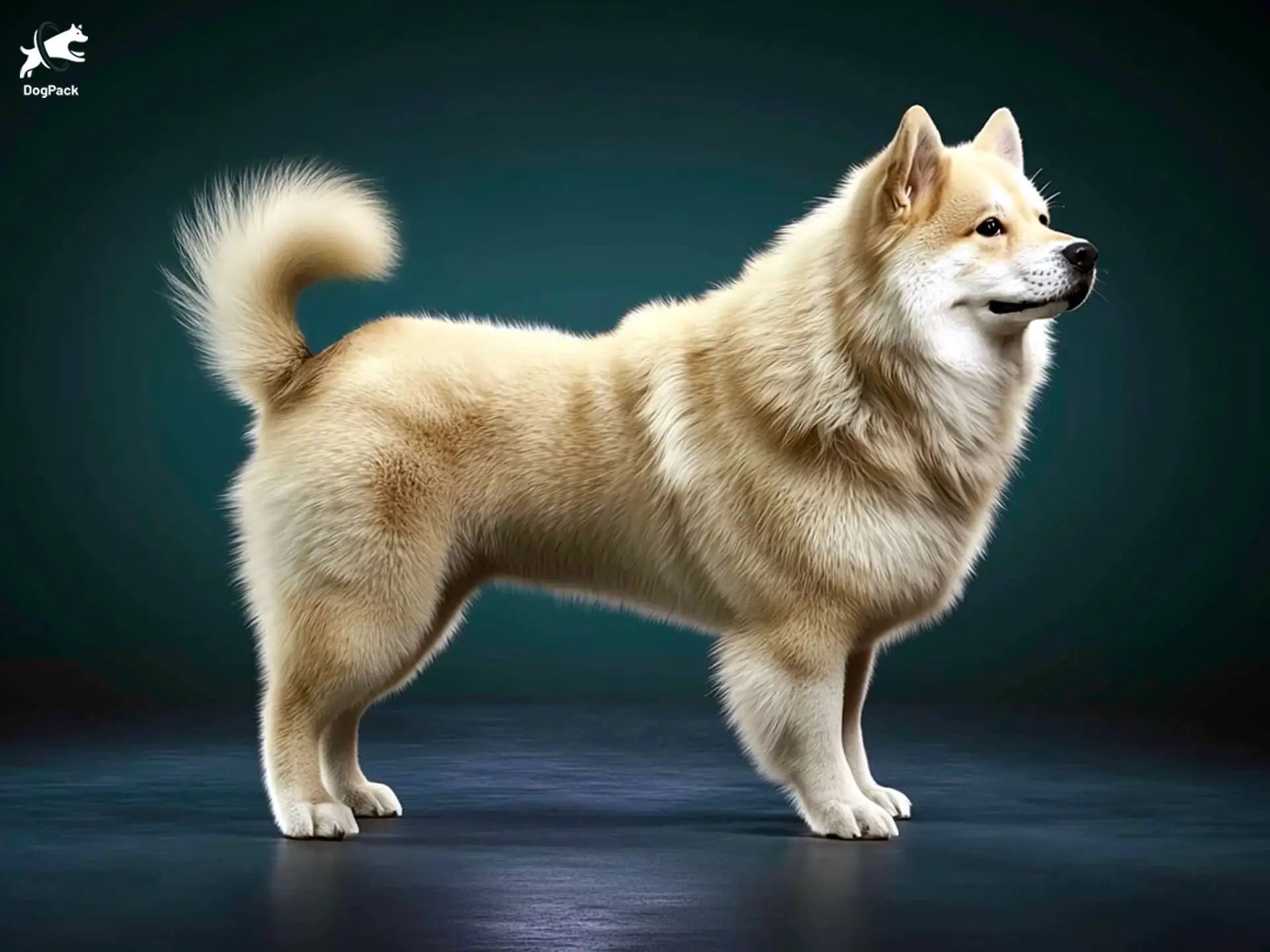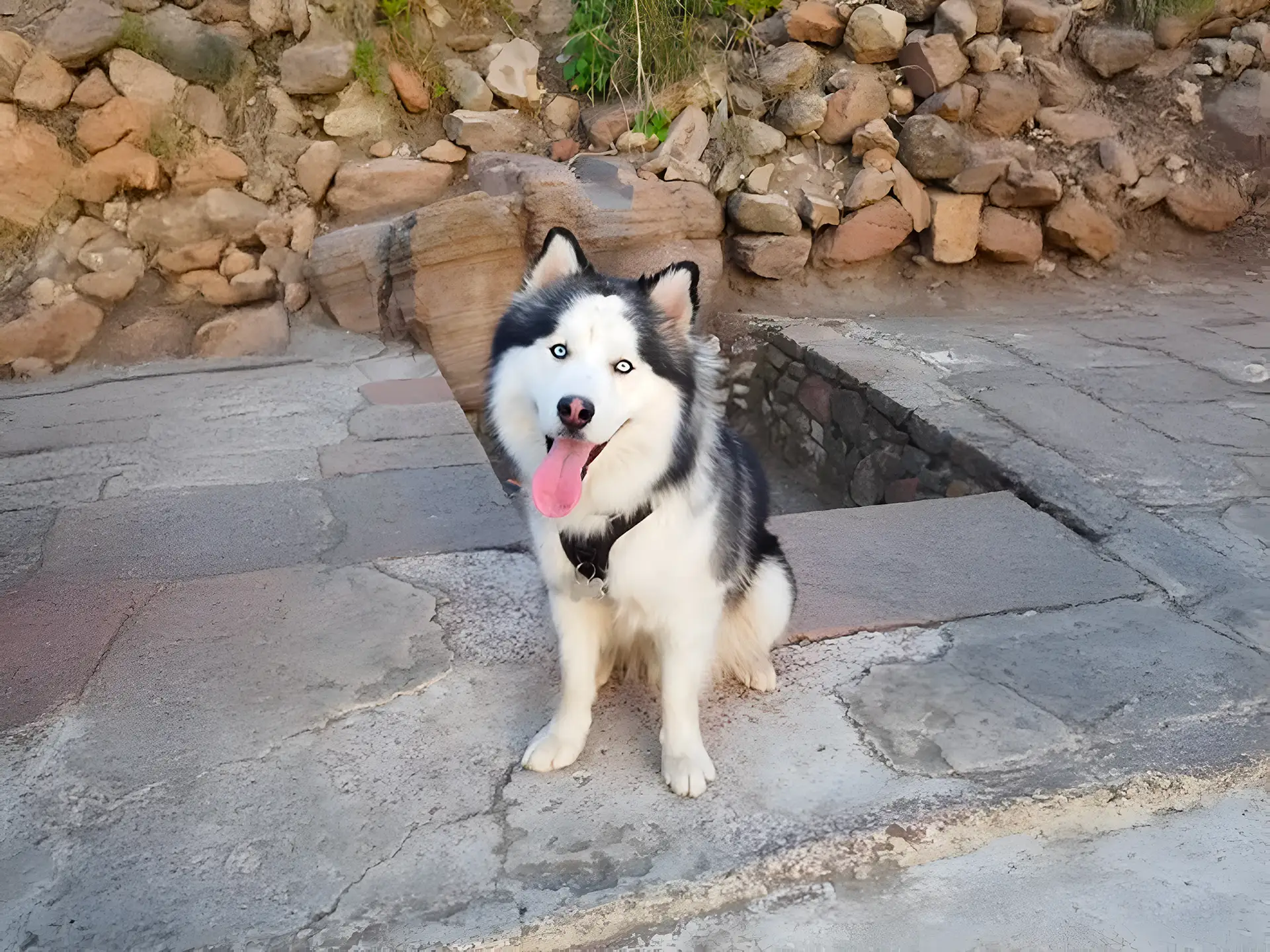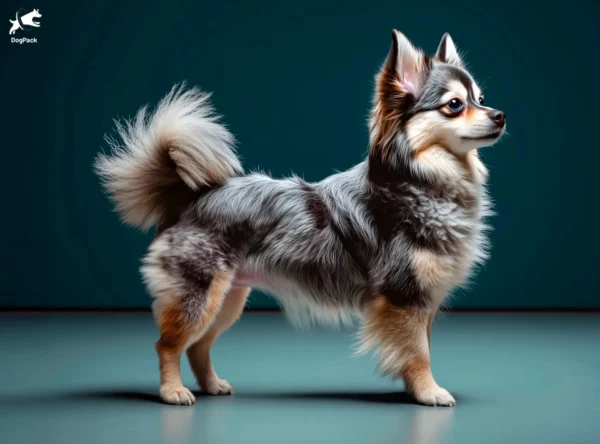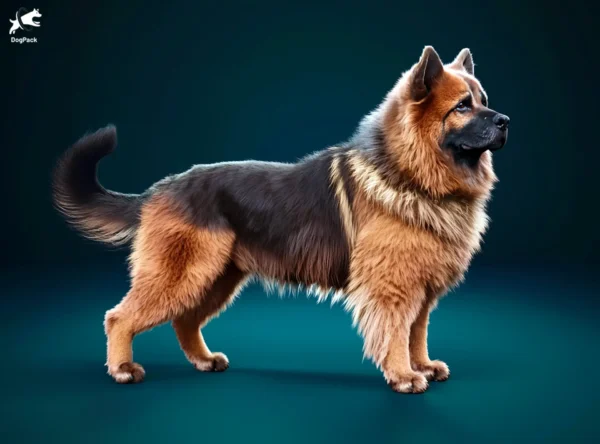Chusky Dog Breed Info & Overview
The Chusky, a cross between the playful Siberian Husky and the protective Chow Chow, is a fluffy and energetic companion with both brains and beauty. Known for its lively spirit and loyalty, this hybrid is ideal for active owners who appreciate a dog that combines intelligence with a striking appearance. With its affectionate personality and unique blend of traits, the Chusky brings both joy and devotion to any home.
Characteristics
Pictures
Breed History
The Chusky is a relatively new hybrid, combining the Siberian Husky and the Chow Chow. While the exact origins are unclear, this mix likely emerged in the United States within the last few decades as designer breeds gained popularity. Breeders aimed to blend the Husky’s energetic demeanor with the Chow’s dignified presence.
Siberian Huskies hail from Northeast Asia, where they were used by the Chukchi people for sled pulling and companionship. Known for their endurance and friendly nature, Huskies bring a lively spirit to the Chusky. On the other hand, the Chow Chow has ancient roots in China, revered for their guarding abilities and distinctive lion-like appearance.
By merging these two breeds, the Chusky inherits a unique combination of traits. The result is a dog that’s not only visually striking but also carries a mix of characteristics suitable for various roles—from a family companion to a vigilant protector. As interest in hybrid breeds grows, the Chusky continues to gain recognition among dog enthusiasts.
Temperament, Personality
The Chusky is known for its loyal and protective nature, often forming strong bonds with family members. They are affectionate yet can be somewhat reserved, especially with strangers. Early socialization is crucial to ensure they grow into well-rounded adults who are comfortable in various situations.
With children, Chuskies can be playful and energetic, making them great playmates for older kids. However, due to their size and exuberance, supervision is recommended around smaller children to prevent accidental knocks or bumps. Their Chow lineage may make them a bit territorial, so proper introductions to other pets are essential.
Intelligent and sometimes independent, the Chusky may exhibit a stubborn streak. This can be a charming trait but requires patience during training. Their alertness makes them excellent watchdogs, and they will not hesitate to alert their owners of any unusual activity around the home.
Physical Characteristics
Physically, the Chusky is a striking dog, often boasting a thick, double-layered coat inherited from both parents. Their fur can come in various colors, including black, red, cream, or a mix, sometimes with the Husky’s characteristic markings. The coat is not just for show; it provides insulation in colder climates.
Chuskies typically have a robust build, standing between 18 to 23 inches tall and weighing from 40 to 65 pounds. Their eyes can be brown, blue, or even heterochromatic, adding to their captivating appearance. The ears are usually erect, a trait from both the Husky and Chow Chow.
One of their most distinctive features is the curled tail, often covered in plush fur, reflecting their Chow heritage. Their facial expressions may carry the Husky’s friendly demeanor or the Chow’s more reserved look. Overall, the Chusky is a blend of elegance and strength, making them stand out in any setting.
Health Issues
Chuskies, like all breeds, can be prone to certain health issues inherited from their parent breeds. Hip dysplasia is a common concern, especially due to their size and active nature. Regular vet check-ups and maintaining a healthy weight can help mitigate the risks associated with joint problems.
Eye conditions such as cataracts or progressive retinal atrophy may also occur in Chuskies. Routine eye examinations are essential to catch any issues early. Additionally, they may be susceptible to allergies, manifesting as skin irritations or digestive problems. Monitoring their diet and environment can help prevent allergic reactions.
Due to their thick coats, Chuskies can be sensitive to heat. It’s important to provide them with a cool environment during warmer months to prevent overheating. Regular grooming not only keeps their coat healthy but also allows for early detection of skin issues or parasites.
Grooming Needs
With their dense double coat, the Chusky requires consistent grooming to keep their fur in top condition. Brushing at least two to three times a week is recommended to remove loose hair and prevent matting. During shedding seasons, daily brushing might be necessary to manage the heavy shedding.
Bathing should be done as needed, typically every few months, to avoid stripping the natural oils from their skin. Using a high-quality dog shampoo can help maintain the coat’s luster and health. Pay special attention to drying their coat thoroughly to prevent any moisture-related skin issues.
Don’t forget about other aspects of grooming: regular nail trims, ear checks, and dental care are all important for the Chusky. Their ears should be checked weekly for signs of infection or wax buildup. Brushing their teeth several times a week can help prevent dental diseases.
Exercise Requirements
The Chusky is an active breed that requires ample daily exercise to keep them physically and mentally stimulated. Aim for at least 60 to 90 minutes of activity each day. This can include walks, runs, or play sessions that challenge both their body and mind.
Activities like hiking, agility training, or even pulling a sled or cart can be great outlets for their energy. Given their Husky heritage, they may have a penchant for running, so ensuring they are in a secure area or on a leash is important to prevent them from wandering off.
Interactive toys and puzzle games can also help satisfy their intellectual needs. Without sufficient exercise, Chuskies may develop unwanted behaviors such as chewing or digging. Regular activity helps keep them happy, healthy, and well-behaved members of the family.
Training Tips
Training a Chusky can be both rewarding and challenging due to their intelligence and occasional stubbornness. Starting obedience training early is crucial. Positive reinforcement methods work best, using treats, praise, and play to motivate them.
Consistency is key with this breed. Establish clear rules and stick to them, as Chuskies can quickly pick up on inconsistencies and may try to test boundaries. Short, engaging training sessions are more effective than long, repetitive ones.
Socialization from a young age is also important. Exposing the Chusky to different people, environments, and other animals helps them become well-adjusted adults. Enrolling in puppy classes or working with a professional trainer can provide additional support.
Nutrition, Diet
Feeding a Chusky requires attention to their active lifestyle and potential sensitivities. High-quality dog food formulated for medium to large breeds with high energy levels is recommended. Look for foods rich in protein to support muscle development and maintenance.
Portion control is important to prevent obesity, which can exacerbate joint issues like hip dysplasia. Typically, an adult Chusky may require between 2.5 to 3 cups of dry food per day, divided into two meals. However, the exact amount can vary based on age, weight, and activity level.
Some Chuskies may have food allergies or sensitivities, so monitoring their reaction to certain ingredients is crucial. Including omega-3 fatty acids in their diet can help maintain a healthy coat and skin. Always provide fresh water and consult with a veterinarian to tailor a diet plan suited to your Chusky’s specific needs.
Adoption, Breeders
If you’re considering adding a Chusky to your family, it’s important to find a reputable breeder who prioritizes the health and well-being of their dogs. Responsible breeders will provide health clearances for both parent breeds and allow you to meet the puppies and their mother.
Adoption is another great option. Sometimes hybrid breeds like the Chusky end up in shelters or rescue organizations. Websites like Petfinder or Adopt-a-Pet can help you locate Chuskies in need of a loving home.
Before bringing a Chusky home, ask the breeder or adoption agency about the dog’s health history, temperament, and any special needs. Ensure you’re prepared for the commitment, as Chuskies require dedicated care and attention. Connecting with breed-specific groups or forums can also provide valuable insights.
Family Pet?
Chuskies can make wonderful family pets, especially for active households. Their affectionate and loyal nature means they often form strong bonds with family members. They thrive in environments where they receive plenty of attention and engagement.
With children, particularly older ones, Chuskies can be great companions. Their playful energy matches well with kids who can handle their exuberance. As with any breed, interactions between dogs and young children should always be supervised to ensure safety for both.
When it comes to other pets, early socialization is key. The Chusky’s prey drive may be high due to their Husky lineage, so introducing them to other animals from a young age can help mitigate potential issues. They may coexist well with other dogs but caution is advised around smaller animals.
Right For You?
Deciding if a Chusky is right for you involves considering your lifestyle and ability to meet their needs. They are best suited for owners who are active and can provide ample exercise and mental stimulation. A Chusky may not be ideal for first-time dog owners due to their training needs.
A spacious home with a securely fenced yard is preferable, as they enjoy outdoor activities and may have a tendency to roam. Apartment living may be challenging unless the owner is committed to fulfilling their exercise requirements.
If you’re looking for a loyal companion who can also serve as a watchdog, the Chusky might be a great match. However, be prepared for the grooming demands and potential health concerns. Ultimately, a Chusky thrives in a home where they are considered a true part of the family.
Conclusion
Bringing a Chusky into your home can be a rewarding experience for the right owner. This breed offers a unique combination of loyalty, intelligence, and striking looks. If you have the time, energy, and dedication to meet their exercise and grooming needs, a Chusky can become a cherished member of your family. They are best suited for those who appreciate both the challenges and joys that come with a hybrid breed combining the Siberian Husky and Chow Chow traits.
FAQs
-
Are Chuskies good guard dogs?
Yes, Chuskies can make excellent guard dogs due to their protective instincts inherited from the Chow Chow. They are naturally alert and will often be wary of strangers, making them vigilant watchdogs for your home.
-
Do Chuskies have a high prey drive?
Chuskies may have a high prey drive, stemming from their Siberian Husky lineage. They might be inclined to chase small animals, so it’s important to keep them on a leash during walks and supervise interactions with smaller pets.
-
How much do Chuskies shed?
Chuskies are heavy shedders thanks to their double coat. They experience seasonal shedding periods where the undercoat is blown out. Regular grooming and brushing can help manage the shedding and keep your home a bit less furry.
-
Are Chuskies hypoallergenic?
No, Chuskies are not hypoallergenic. Due to their significant shedding, they produce dander that can trigger allergies. Individuals with pet allergies may find that this breed exacerbates their symptoms.
-
What colors do Chuskies come in?
Chuskies can exhibit a variety of coat colors, including black, red, cream, gray, or a combination of these. They may also have markings similar to Huskies or the solid colors typical of Chow Chows.
Breed Ratings
The Chusky is quite intelligent, inheriting sharp minds from both parent breeds. They learn quickly but may show stubbornness at times.
Chuskies are playful and enjoy interactive games, making them fun companions for active families and individuals.
This breed has a high energy level and requires daily exercise to stay content and prevent boredom-related behaviors.
Chuskies shed heavily, especially during seasonal changes. Regular grooming is essential to manage their thick double coat.
They have a strong prey drive and may chase small animals. Care should be taken when around cats or wildlife.
Due to their dense coat and heavy shedding, grooming a Chusky requires significant effort and regular attention.
While intelligent, Chuskies can be stubborn. Consistent, positive training methods are necessary for successful obedience training.
Chuskies prefer companionship and may develop separation anxiety if left alone for long periods.
They may bark or howl moderately, especially if bored or alerting their owners to something unusual.
Chuskies generally do not drool excessively, making them relatively tidy in this regard.
With proper socialization, they can get along with other dogs but may display dominance or territorial behavior.
Chuskies can be prone to certain genetic health issues. Regular veterinary care is important to maintain their well-being.














